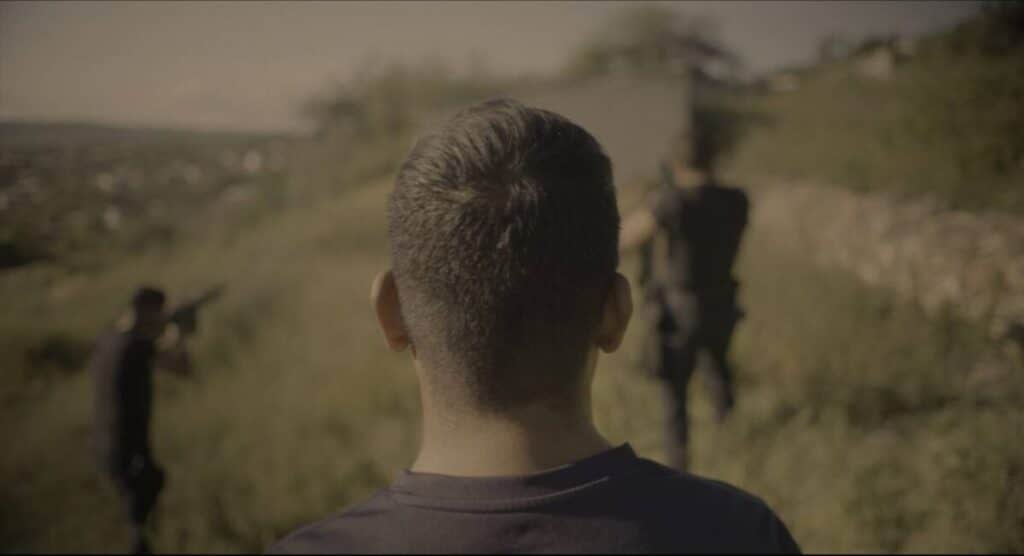
When you so much as glimpse the subject matter of A Wolfpack Called Ernesto (Una jauría llamada Ernesto), you may come away with certain expectations, so this review will start by explaining what Wolfpack is not. Despite being about Mexican cartel-linked violence and its impact on communities, this is not an ultraviolent, deliberately shocking, ‘hail of bullets’ treatment of street crime. It is shocking, but that shock comes on slowly, and via rather unusual means. No, this take on the documentary format hands us an unconventional and humane take on its subject, one which feels very immediate, very real and everyday: this is its key strength. It won’t be for everyone, but it absolutely deserves to be seen and evaluated on its many merits.
As the opening credits roll, and before we get a picture to accompany the sound, there seems to be a game of basketball taking place – so immediately we get a sense of an urban location, and (most likely) a young, male group of players. When we get visuals this turns out to be a correct guess, and we’re thrown straight into in medias res as we play catch-up with a group of young guys chatting about…well, we’re never really privy to the conversations taking place on screen. They fade in and out, or they’re too quiet to be heard; they’re not for us. We also have to contend with the ingenious framing device of a shoulder-mounted camera (actually iPhones), worn on a scorpion’s tail harness. This makes it feel as though we are with the film’s subjects, but held apart from them at the same time. It’s quite a strange experience at first (fans of Gaspar Noé may feel more at home with it), but it certainly feels more intimate than a standard fly-on-the-wall approach. Furthermore, we learn all we learn about the film’s various characters through the use of their voiceovers, with only one or two deviations from this throughout the film. What we are told and shown is carefully controlled and constructed.
Things start with some of these young men recounting memories from their childhoods, games and pastimes which began to skirt closer and closer to criminal behaviour; eventually, this meant hanging out with older boys who, alongside some family connections for some of the speakers, meant an introduction to gang life. Grooming; it’s grooming, even though that particular word isn’t used and may or may not have made the leap from the English-speaking world to the Spanish-speaking one. Other youngsters, other members of the Ernesto gang (one name which is used for several anonymous speakers) take over and introduce their own voiceovers – their tales are similar – and then, older gang members appear, to describe their experiences, too. Although there’s not so much as a raised voice at any point during the film, you can’t help but pick up a sense of alarm; something about all of this is so inescapable, and the more we begin to hear about drugs, guns, cross-border criminality and other features of gang life, talked about very casually, the more chilling it all feels. There’s a slowly building picture here, via an ongoing tally of different people and personal perspectives: poverty, poverty’s very narrow idea of ‘luxury’, crime as a means of power and death as a kind of occupational hazard; these come up again and again.
What the film reveals, and how it is done, is startling, subtle and considered. To return to the shooting style, never seeing the faces of the people associated with each voiceover takes some getting used to, as does the way that the anonymising back-of-head shot also occupies nearly all of the frame. Added to that, any other occupants of the frame are usually kept out of focus; this makes the viewer feel quite helpless, a bit reliant even, on where the film is choosing to take us: if that’s not a symbolic decision – though I am assuming it is – then the way it keeps us following blindly, with little sense of an overarching perspective, is very clever and fitting. Likewise, the film is big on the use of total darkness, with the film cutting to black as a means of punctuating between scenes and speakers, and this also has an impact along similar lines. But whether or not this is all intended to mirror the thoughts and feelings of the different speakers in the film, it is definitely a very ambitious, clever creative decision which pays off. The use of dramatic music – which often fades in and out of street music, played on radios or home stereos – is very compelling too.
What the film reveals is understated, for the most part, and a careful representation of bigger truths. A lot is said these days about the notion of ‘toxic masculinity’, and in a lot of cases, this has already turned into a rather lazy label for an ever-billowing range of traits or behaviours, but do you know what? A Wolfpack Called Ernesto shows us toxic masculinity in spades. Its culture of competitive violence and one-upmanship, where weakness is punished and the insult ‘fag’ is hurled at anyone perceived to actually be weak, is both a response to Mexico’s endemic unfairness and also the means of its perpetuation, as everyone involved suffers. The toxic repercussions of weird ideas about ‘respect’ have a lot to answer for here. But by elaborating on all of this (with only the briefest hint that there is a life for these men outside of the gang), the film humanises the key players in ways which statistics or depictions of bloodshed could not. The casual, fatalistic attitude which we encounter, as spoken, is chilling because it is so utterly normal, and so much of the film is utterly normal, too: we walk with the different characters through home interiors, markets, alleys, ride on scooters, peer over balconies. It would all be incredibly humdrum, if not for the guns, so often on screen, just out of focus but undeniably there, in people’s hands, as if they were – nothing.
You don’t get to the end of A Wolfpack Called Ernesto feeling uplifted, as though justice has been done – and that’s the point. There’s no big denouement here where someone walks off into the sunset, a sadder and a wiser man. But this is an engaging, unorthodox and gripping crime tale which leaves its mark.
A Wolfpack Called Ernesto (2023) will be released via Sovereign Films on 23rd February 2024.
